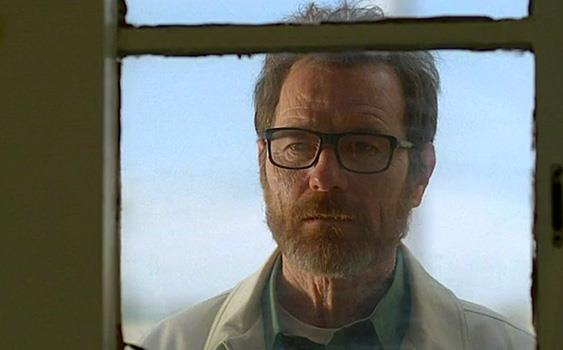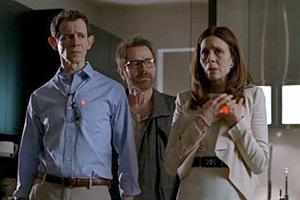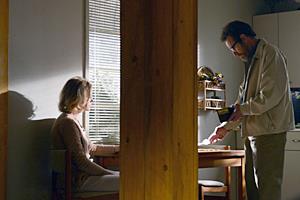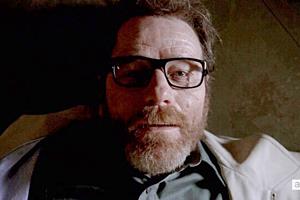The Last 'Breaking Bad' Up Close

[Editor's Note: This story reveals details of Sunday's Sept. 30 episode of Breaking Bad, "Felina."]
It tied up loose ends rather than leaving viewers to their own devices with an open-ended copout. The end result: a gripping denouement clogged with commercials and a few considerable stretches in “reality.” But satisfying nonetheless, with a final shot of Bryan Cranston’s Walter White bleeding out (happily?) amid comfortable meth lab surroundings to the perfect song for the occasion.
“We went through a lot of false starts and endings that went nowhere,” creator/executive producer Vince Gilligan said during the final post mortem edition of Talking Bad. They ended up opting for closure, with Walter close to being heroic in his final minutes while his dark-sided, long-suffering Robin, Jesse PInkman (Aaron Paul), at last caught a break and drove away from his oppressors while laughing/crying through the night.
AMC, seemingly intent on paying for the entire 62-episode run of Breaking Bad in one big night, threatened to break the mood with five lengthy commercial breaks. At times it almost reduced the most anticipated TV finale of the year into filler amid a sea of ads. The buyers were paying premium prices, and more than a half-dozen of them pitched upcoming feature films, including Aaron Paul’s big-screen coming out party as the star of Need For Speed (“coming this spring”). AMC also flogged the complete Breaking Bad boxed set, loaded with “Extras” and available on Nov. 26th.
Commerce couldn’t quite get in the way of the main event, though. It initially was a bit much to believe that Walter could get away with impersonating a New York Times reporter -- via a pay phone -- in his successful attempt to get the address of billionaire Elliot Schwartz (Adam Godley) and his wife, Gretchen (Jessica Hecht). He had been instrumental in the founding of their company, Gray Matter, but left before its mammoth success after failing to light Gretchen’s flame.
The ingenious payoff to their three-way reunion made it almost immaterial how Walter got to their home after that long last redemptive journey from frozen New Hampshire. He dropped his entire stash of $9.7 million in cash on them, with the understanding that Elliot and Gretchen would leave it in a blind trust to Walter Jr. (RJ Mitte) and baby Holly.
“My children are blameless victims of their monster father,” he told the terrified couple, who finally agreed. Then came the true brilliance, with Elliot and Gretchen both pinpointed by orange-red lasers as Walter told them he’d hired “the two best hit men west of the Mississippi” to ensure they’d follow through.

Back in Walter’s car, the hit men turned out to be Breaking Bad’s recurring and always welcome junkies, “Skinny Pete” (Charles Baker) and “Badger” (Matt L. Jones). Leave it to Gilligan to find a thoroughly imaginative way to work them back in.
Walter saved his last dose of deadly ricin for haughty drug kingpin Lydia Rodarte-Quayle (Laura Fraser), letting her sprinkle it into her standard order of chamomile tea at the diner she used to cut deals. He then all-too-easily slipped into the “safe house” where wife Skyler (Anna Gunn) supposedly was being protected from him.
“It’s over,” he told her in the five minutes he allotted himself. “And I needed a proper goodbye.”
Walter offered her a possible escape from prosecution via the GPS coordinates that would lead authorities to the graves of her brother-in-law, Hank Schrader (Dean Norris), and his partner, Steve Gomez (Michael Quezada). He then at last spoke the core truth about why he became a meth cooker in the first place. It wasn’t really to ensure a bounteous nest egg for his “family” after the cancer diagnosis came calling. It was to emancipate him from the emasculation he had long felt as a commonplace chemistry teacher.

A pair of longing looks -- at baby Holly up-close and son Walter Jr. from afar -- presaged his final destination. Walter had first gone to his home away from home -- the desert -- to rig up a super MacGyver-like armament for his trip to the white supremacist “Clubhouse.” Its head subhuman, “Uncle Jack” Welker (Michael Bowen), had orchestrated both the stealing of the lion’s share of Walter’s money and the enslavement of protege Jesse. His innocent-looking but lethal nephew, Todd Alquist (Jesse Plemons), was also in the house.
The final bloodbath was triggered by a click of Walter’s key chain after he again bought some time by talking himself out of a bullet to the head. Up popped the car trunk and out came an automatic weapon spewing hundreds of rounds into The Clubhouse while Walter dove onto Jesse and tried to shield him from the carnage. Patently unbelievable? Well, you could say that. On the other hand, Walter White could probably sculpt a working TV set out of a pumpkin and some baling wire. So all of this remained at least remotely plausible.
Jesse then got the supreme satisfaction out of choking Todd to death with the chains that had bound him. Walter wanted the same fate, but via a pistol.
“Do it. You want this,” he told Jesse, who saw that his mentor/antagonist/benefactor/Lucifer was already bleeding heavily through his jacket.
But Jesse demanded that “Mr. White” say the words. “I want this,” he complied before Jesse delivered the final blow: “Then do it yourself.”

So did he in fact get what he deserved? Or did maestro Gilligan sanctify him in the end? The latter is closer to the truth. But better to have “Heisenberg” go out this way than being last seen blazing away in the mold of Tony “Scarface” Montana. The chemistry teacher turned murderer acted honorably in the end after triggering a wealth of physical and emotional carnage. And whatever your view of that, you haven’t been left dangling in the wind.
Breaking Bad goes down as one of TV’s all-time greats, with a following that kept on building through its final eight-episode arc. It wasn’t the sheer volume of viewers. It was the sheer shared joy of it all, whether of belated binge-viewing or being on board at the start for the entire five-season run.
Sunday night’s final national Nielsen ratings won’t tell nearly the whole story. Breaking Bad may well have been outdrawn by NBC’s competing Sunday Night Football. But millions more eventually will claim to have watched what became a series of epic proportions. And to borrow in the end from Dylan instead of Badfinger, “It’s all over now, baby blue.”